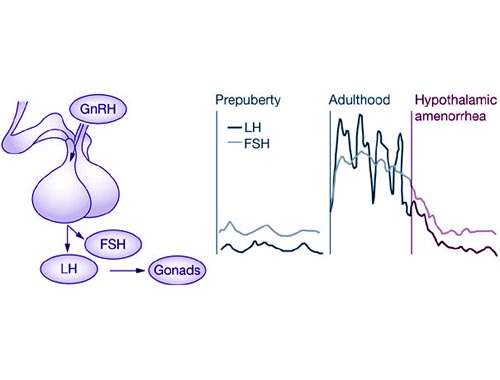Hypothalamic dysfunction, Hypothalamic amenorrhea
Abnormal function of the thalamus located in the brain. The thalamus controls pituitary gland function which in turn controls other hormone producing glands such as the thyroid gland, adrenal gland, ovaries and testes. The thalamus also regulates functions such as temperature control, emotions, sleep, appetite and salt balance. Abnormal thalamus functioning may be caused by such things as surgery, infection, genetic disorders, poor nutrition and tumors. Hypothalamic amenorrhea is the absence of menstruation for several months due to impaired hormone production and regulation by the hypothalamus. Several behavioral and circumstantial factors may contribute to the development of this condition. Treatment is dependent on the cause for the hypothalamic dysfunction and may require dietary and lifestyle changes or the use of prescription medication to restore proper ovulation and menstruation. Considered the main hub of communication that influences menstruation and controls reproductive function, the hypothalamus produces the hormone gonadotropin releasing hormone (GnRH). When released, GnRH triggers the production of additional hormones essential to menstruation, namely follicle stimulating hormone (FSH), estrogen, and luteinizing hormone (LH). If the hypothalamus ceases to produce GnRH, communication shuts down, stopping ovulation and menstruation. Hypothalamus dysfunction may result from a variety of circumstances and behaviors. Women with a low body weight for their height or those who exercise excessively may develop hypothalamic amenorrhea. Eating disorders, such as bulimia and anorexia, may also induce symptoms. Extreme emotional stress can sometimes interfere with proper hypothalamus function, causing a disruption in hormone regulation. Additional factors that may contribute to hypothalamic amenorrhea may include the presence of a tumor and thyroid malfunction. The most common, and obvious, symptom associated with hypothalamic amenorrhea is the absence of menstruation for three or more months. Some women may experience additional symptoms that can include vision changes and persistent headache. Medical attention should be sought if menstruation fails to start by age 16 or has regularly occurred and suddenly stops.
